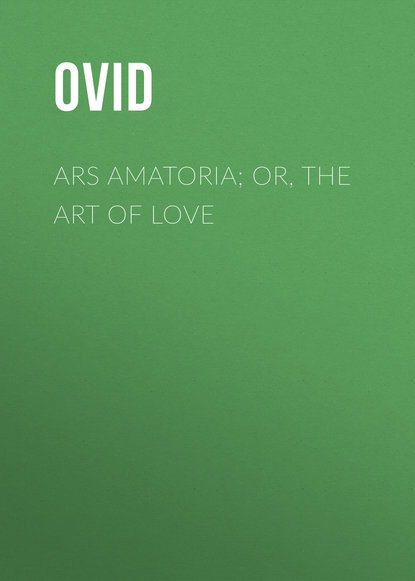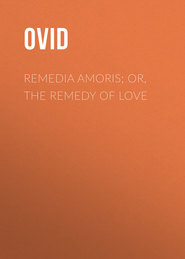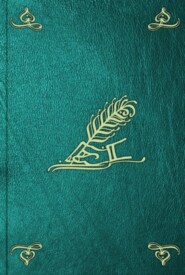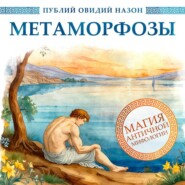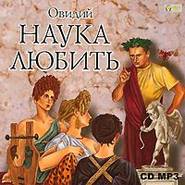По всем вопросам обращайтесь на: info@litportal.ru
(©) 2003-2024.
✖
Ars Amatoria; or, The Art Of Love
Настройки чтения
Размер шрифта
Высота строк
Поля
1039 (return (#x3_x_3_i17))
[ And the little patch.—Ver. 202. 'Aluta' means 'skin made soft by means of alum.' It is difficult to discover what it means here, whether 'a patch' made of a substance like gold-beater's skin, somewhat similar to those used in the days of the Spectator; or a liquid cosmetic, such as Pliny calls 'calliblepharum,' 'an aid to the eye-brows.' He seems to use the word 'sinceras' in its primitive sense, 'without wax'; which recommendation certainly would contradict the common reading, 'cera,' in the 199th line.]
1040 (return (#x3_x_3_i17))
[ To mark the eyes.—Ver. 203. To heighten the colour of the eyelashes, ashes (and probably charcoal) were u»ed by the Roman women. Saffron also was used. A black paint, made of pulverized antimony, is used by the women in the East, at the present day, to paint their eyebrows black. It is called 'surme,' and was also used at ancient Rome. Cydnus was a river of Cilicia.]
1041 (return (#x3_x_3_i17))
[ A little treatise.—Ver. 205. He alludes to his book, 'On the care of the Complexion,' of which a fragment remains.]
1042 (return (#x3_x_3_i18))
[ Of the cesypum.—Ver. 213. The filthy cosmetic called 'cesypum,' was prepared from the wool of those parts of the body where the sheep perspired most; it was much used for embellishing the complexion. Pliny mentions the sheep of Athens as producing the best. It had a strong rank smell. The red colour, which was used by the Roman ladies for giving a bloom to the skin, was prepared from a moss called 'fucus'; from which, in time, all kinds of paint received the name of 'fucus.']
1043 (return (#x3_x_3_i18))
[ Of the deer.—Ver. 215. Pliny speaks highly of the virtues of stag's marrow. It probably occupied much the same position in estimation, that bear's grease does at the present day.]
1044 (return (#x3_x_3_i18))
[ Myron.—Ver. 219. There were two sculptors of this name: one a native of Lycia, the other of Eleuthera.]
1045 (return (#x3_x_3_i18))
[ Beautiful statue.—Ver. 223. He alludes to that of Venus Anadyomene, or rising from the sea, which was made by Praxiteles, and was often copied by the sculptors of Greece and Rome.]
1046 (return (#x3_x_3_i19))
[ Pierces her arms.—Ver. 240. See a similar passage in the Amores. Book i. El. xiv. 1. 16.]
1047 (return (#x3_x_3_i20))
[ Toilet in the temple.—Ver. 244. He tells those who have not fine heads of hair, to be as careful in admitting any men to see their toilet, as the devotees of Bona Dea were to keep away all males from her solemnities.]
1048 (return (#x3_x_3_i20))
[ Sidonian fair.—Ver. 252. Europa was a Phoenician by birth.]
1049 (return (#x3_x_3_i21))
[ With the clothes.—Ver. 226. See the Amores, Book i. El. iv. 1.48, and the Note.]
1050 (return (#x3_x_3_i21))
[ With purple stripes.'—Ver. 269. Commentators are at a loss to know what 'tingere virgis' means; some suggest, 'to wear garments with red 'virgæ,' or 'stripes,'while others think that it means 'to tint the skin with fine lines of a purple colour.' It is thought by some that vermilion is here alluded to, while others suppose that the juice of the red flowers, or berries of the 'vaccinium,' is meant.]
1051 (return (#x3_x_3_i21))
[ The Pharian fish.—Ver. 270. The intestines and dung of the crocodile, 'the Pharian' or 'Egyptian fish,' are here referred to. We learn from Pliny that these substances were used by the females at Rome as a cosmetic, to add to the fairness of the complexion, and to take away freckles from the skin.]
1052 (return (#x3_x_3_i21))
[ Small pads are suitable.—Ver. 273 'Analectides,' or 'Analectrides,' (the correct reading is doubtful) were pads, or stuffings, of flock, used in cases of high shoulders or prominent shoulder-blades.]
1053 (return (#x3_x_3_i21))
[ And let the girth.—Ver. 274. He alludes to the 'strophium,' which distantly resembled the stays of the present day, and was a girdle, or belt, worn by women round the breast and over the interior tunic or chemise. From an Epigram of Martial, it seems to have been usually made of leather. Becker thinks that there was a difference between the 'fascia' and the 'strophium.']
1054 (return (#x3_x_3_i21))
[ At a distance.—Ver. 278. One of the very wisest of his suggestions.]
1055 (return (#x3_x_3_i23))
[ Umbrian.—Ver. 303. The Umbrians were a people of the Marsi, in the north of Italy. They were noted for their courage, and the rusticity of their manners.]
1056 (return (#x3_x_3_i24))
[ The son of Sisyphus.—Ver. 313. He here alludes to a scandalous story among the ancients, that Ulysses was the son of Anticlea, by Sisyphus the robber, who had carried her off, and not by Laertes, her husband.]
1057 (return (#x3_x_3_i24))
[ The wax.—Ver. 314. By the advice of Circe, Ulysses filled the ears of his companions with melted wax, that they might not hear the songs of the Sirens.]
1058 (return (#x3_x_3_i24))
[ The measures of the Nile.—Ver. 318. These airs were sung by Egyptian girls, with voluptuous attitudes, and were much esteemed by the dissolute Romans. These Egyptian singers were, no doubt, the forerunners of the 'Alme' of Egypt at the present day. The Nautch girls and Bayaderes of the East Indies are a kindred race.]
1059 (return (#x3_x_3_i24))
[ Plectrum.—Ver. 319. See the Metamorphoses, Book ii. 1. 601, and the Note; also the Epistle of Briseïs, 1. 118, and the Note.]
1060 (return (#x3_x_3_i24))
[ Thy mother.—Ver. 323. Amphion and Zethuswere the sons of Jupiter and Antiope. Being carried off by her uncle Lycus, Antiope was entrusted to his wife Dirce. When her sons grew up, they fastened Dirce to wild oxen, by which she was tom to pieces. Amphion was said to have built the walls of Thebes by the sound of his lyre.]
1061 (return (#x3_x_3_i24))
[ Arion.—Ver. 326. See the Fasti, Book ii. 1. 79.]
1062 (return (#x3_x_3_i24))
[ The festive psaltery.—Ver. 327. Suidas tells us that 'naulium,' or 'nablium,' was a name of the psaltery. Josephus says that it had twelve strings. Strabo remarks that the name was of foreign origin.]
1063 (return (#x3_x_3_i25))
[ Callimachus.—Ver. 329. See the Amores, Book ii. El. iv. 1. 19: and the Pontic Epistles, Book iv. Ep. xvi. 1. 32, and the Notes of the passages.]
[ And the little patch.—Ver. 202. 'Aluta' means 'skin made soft by means of alum.' It is difficult to discover what it means here, whether 'a patch' made of a substance like gold-beater's skin, somewhat similar to those used in the days of the Spectator; or a liquid cosmetic, such as Pliny calls 'calliblepharum,' 'an aid to the eye-brows.' He seems to use the word 'sinceras' in its primitive sense, 'without wax'; which recommendation certainly would contradict the common reading, 'cera,' in the 199th line.]
1040 (return (#x3_x_3_i17))
[ To mark the eyes.—Ver. 203. To heighten the colour of the eyelashes, ashes (and probably charcoal) were u»ed by the Roman women. Saffron also was used. A black paint, made of pulverized antimony, is used by the women in the East, at the present day, to paint their eyebrows black. It is called 'surme,' and was also used at ancient Rome. Cydnus was a river of Cilicia.]
1041 (return (#x3_x_3_i17))
[ A little treatise.—Ver. 205. He alludes to his book, 'On the care of the Complexion,' of which a fragment remains.]
1042 (return (#x3_x_3_i18))
[ Of the cesypum.—Ver. 213. The filthy cosmetic called 'cesypum,' was prepared from the wool of those parts of the body where the sheep perspired most; it was much used for embellishing the complexion. Pliny mentions the sheep of Athens as producing the best. It had a strong rank smell. The red colour, which was used by the Roman ladies for giving a bloom to the skin, was prepared from a moss called 'fucus'; from which, in time, all kinds of paint received the name of 'fucus.']
1043 (return (#x3_x_3_i18))
[ Of the deer.—Ver. 215. Pliny speaks highly of the virtues of stag's marrow. It probably occupied much the same position in estimation, that bear's grease does at the present day.]
1044 (return (#x3_x_3_i18))
[ Myron.—Ver. 219. There were two sculptors of this name: one a native of Lycia, the other of Eleuthera.]
1045 (return (#x3_x_3_i18))
[ Beautiful statue.—Ver. 223. He alludes to that of Venus Anadyomene, or rising from the sea, which was made by Praxiteles, and was often copied by the sculptors of Greece and Rome.]
1046 (return (#x3_x_3_i19))
[ Pierces her arms.—Ver. 240. See a similar passage in the Amores. Book i. El. xiv. 1. 16.]
1047 (return (#x3_x_3_i20))
[ Toilet in the temple.—Ver. 244. He tells those who have not fine heads of hair, to be as careful in admitting any men to see their toilet, as the devotees of Bona Dea were to keep away all males from her solemnities.]
1048 (return (#x3_x_3_i20))
[ Sidonian fair.—Ver. 252. Europa was a Phoenician by birth.]
1049 (return (#x3_x_3_i21))
[ With the clothes.—Ver. 226. See the Amores, Book i. El. iv. 1.48, and the Note.]
1050 (return (#x3_x_3_i21))
[ With purple stripes.'—Ver. 269. Commentators are at a loss to know what 'tingere virgis' means; some suggest, 'to wear garments with red 'virgæ,' or 'stripes,'while others think that it means 'to tint the skin with fine lines of a purple colour.' It is thought by some that vermilion is here alluded to, while others suppose that the juice of the red flowers, or berries of the 'vaccinium,' is meant.]
1051 (return (#x3_x_3_i21))
[ The Pharian fish.—Ver. 270. The intestines and dung of the crocodile, 'the Pharian' or 'Egyptian fish,' are here referred to. We learn from Pliny that these substances were used by the females at Rome as a cosmetic, to add to the fairness of the complexion, and to take away freckles from the skin.]
1052 (return (#x3_x_3_i21))
[ Small pads are suitable.—Ver. 273 'Analectides,' or 'Analectrides,' (the correct reading is doubtful) were pads, or stuffings, of flock, used in cases of high shoulders or prominent shoulder-blades.]
1053 (return (#x3_x_3_i21))
[ And let the girth.—Ver. 274. He alludes to the 'strophium,' which distantly resembled the stays of the present day, and was a girdle, or belt, worn by women round the breast and over the interior tunic or chemise. From an Epigram of Martial, it seems to have been usually made of leather. Becker thinks that there was a difference between the 'fascia' and the 'strophium.']
1054 (return (#x3_x_3_i21))
[ At a distance.—Ver. 278. One of the very wisest of his suggestions.]
1055 (return (#x3_x_3_i23))
[ Umbrian.—Ver. 303. The Umbrians were a people of the Marsi, in the north of Italy. They were noted for their courage, and the rusticity of their manners.]
1056 (return (#x3_x_3_i24))
[ The son of Sisyphus.—Ver. 313. He here alludes to a scandalous story among the ancients, that Ulysses was the son of Anticlea, by Sisyphus the robber, who had carried her off, and not by Laertes, her husband.]
1057 (return (#x3_x_3_i24))
[ The wax.—Ver. 314. By the advice of Circe, Ulysses filled the ears of his companions with melted wax, that they might not hear the songs of the Sirens.]
1058 (return (#x3_x_3_i24))
[ The measures of the Nile.—Ver. 318. These airs were sung by Egyptian girls, with voluptuous attitudes, and were much esteemed by the dissolute Romans. These Egyptian singers were, no doubt, the forerunners of the 'Alme' of Egypt at the present day. The Nautch girls and Bayaderes of the East Indies are a kindred race.]
1059 (return (#x3_x_3_i24))
[ Plectrum.—Ver. 319. See the Metamorphoses, Book ii. 1. 601, and the Note; also the Epistle of Briseïs, 1. 118, and the Note.]
1060 (return (#x3_x_3_i24))
[ Thy mother.—Ver. 323. Amphion and Zethuswere the sons of Jupiter and Antiope. Being carried off by her uncle Lycus, Antiope was entrusted to his wife Dirce. When her sons grew up, they fastened Dirce to wild oxen, by which she was tom to pieces. Amphion was said to have built the walls of Thebes by the sound of his lyre.]
1061 (return (#x3_x_3_i24))
[ Arion.—Ver. 326. See the Fasti, Book ii. 1. 79.]
1062 (return (#x3_x_3_i24))
[ The festive psaltery.—Ver. 327. Suidas tells us that 'naulium,' or 'nablium,' was a name of the psaltery. Josephus says that it had twelve strings. Strabo remarks that the name was of foreign origin.]
1063 (return (#x3_x_3_i25))
[ Callimachus.—Ver. 329. See the Amores, Book ii. El. iv. 1. 19: and the Pontic Epistles, Book iv. Ep. xvi. 1. 32, and the Notes of the passages.]





